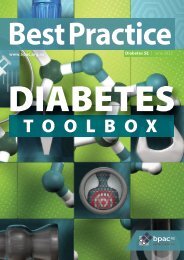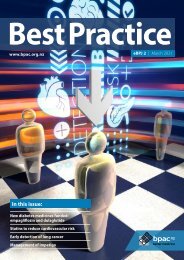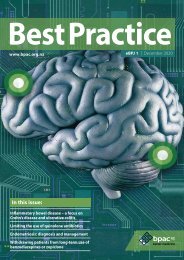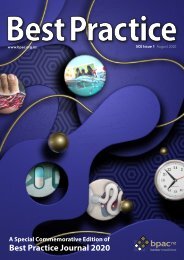Create successful ePaper yourself
Turn your PDF publications into a flip-book with our unique Google optimized e-Paper software.
emphasise that withdrawing a preventative medicine<br />
does not mean you are “giving up” on them. It may be<br />
appropriate to discuss Advance Care Planning.<br />
For further information on assessing frailty, see: “Identifying<br />
frailty in primary care” in “Frailty in older people: a discussion” ,<br />
www.bpac.org.nz/2018/frailty.aspx<br />
Training material and an Advance Care Planning manual<br />
for health professionals are available from: www.hqsc.govt.<br />
Conduct a medicines reconciliation or “brown bag<br />
review”<br />
A medicines reconciliation aims to ensure that the medicines<br />
a patient is actually taking are the same as what has been<br />
prescribed to them according to their medical records. 2 Ask<br />
patients to bring in all the medicines they are currently taking,<br />
including over-the-counter (OTC) medicines and supplementary<br />
products. This is also an opportunity to check that the patient<br />
understands what each of their prescribed medicines are for<br />
and whether there are any issues with adherence.<br />
Clinicians can reflect on whether any changes should be made<br />
to a patient’s prescribed regimen by asking themselves or the<br />
patient/caregiver: 9<br />
Is the original condition which the medicine was<br />
prescribed for still present?<br />
Are medicines initiated for symptomatic management<br />
providing adequate relief?<br />
Are there any medicines which do not have a clear<br />
indication for use?<br />
Has there been a change in the patient’s health status,<br />
e.g. frailty or falls, which alters the balance between the<br />
benefits and possible harms of a medicine?<br />
Are there any duplications, e.g. two medicines from<br />
the same class to treat the same condition when one is<br />
sufficient?<br />
Are any simplifications in their regimen possible? e.g.,<br />
once daily medicines or combination tablets.<br />
Were any medicines initiated to treat an adverse reaction<br />
to another medicine, i.e. a prescribing cascade? If so,<br />
could both medicines be stopped?<br />
Is there a risk of medicine interactions, including OTC or<br />
supplements?<br />
Is the treatment target appropriate, e.g. HbA 1c<br />
or blood<br />
pressure?<br />
Is the dose appropriate? e.g., declining renal function<br />
may mean a lower dose is required in an older adult.<br />
nz/our-programmes/advance-care-planning/projects/staffinformation/<br />
Could a non-pharmacological treatment be used<br />
instead? e.g., exercise or physiotherapy for patients with<br />
osteoarthritis, instead of NSAIDs.<br />
Does the patient have any concerns regarding their<br />
prescription regimen?<br />
Best practice tip: Provide patients with a medicines list<br />
that includes what each medicine they take is prescribed for<br />
and whether it is used for prevention or treatment of an existing<br />
condition; pharmacists can also provide this list. An example<br />
of a medicines list can be found here: https://activities.nps.<br />
org.au/nps-order-form/Resources/English-Medicines-List-<br />
March-2016.pdf<br />
The balance of benefits and harms associated with a<br />
medicine may change in older people<br />
Commonly prescribed medicines that are associated with an<br />
increased risk of adverse effects in older adults, particularly<br />
those with frailty, are shown in Table 1. Increased attention<br />
to combinations of medicines that can lead to adverse effects<br />
may be more useful than focusing on individual medicines.<br />
Implementing changes<br />
Act while the patient is engaged. Many people are open to<br />
the idea of stopping medicines if their general practitioner<br />
considers it beneficial. 16 If a patient or caregiver raises questions<br />
or concerns about the number of medicines they are taking,<br />
use this as an opportunity to carry out a review.<br />
Withdraw one medicine at a time. This can help identify which<br />
medicine was causing an adverse effect or discontinuation<br />
symptoms develop after stopping. 1 Some medicines, e.g.<br />
benzodiazepines, antidepressants, proton pump inhibitors<br />
(PPIs), should be withdrawn by tapering doses (see: “Stepping<br />
down PPI treatment”).<br />
Work in collaboration with a pharmacist. This can help to<br />
ensure that a patient’s regimen is the most appropriate for<br />
their circumstances and co-morbidities. Pharmacists also offer<br />
services to assist with medicine adherence and simplifying<br />
regimens, e.g. Medicines Therapy Assessment, Medicines Use<br />
Review, Long-Term Conditions pharmacy service.<br />
Review medicines before and after a stay in hospital. Where<br />
possible, simplify a patient’s regimen prior to planned hospital<br />
admission, ensure that all medicines have a clear indication,<br />
and check that they are aware of, and follow, any changes to<br />
their usual regimen. Following discharge, ensure that medicines<br />
initiated in hospital with the intention of short-term use are<br />
not continued long-term and any duplicated or inappropriate<br />
medicines are stopped. 5<br />
www.bpac.org.nz<br />
Best Practice Journal – SCE Issue 1 39









